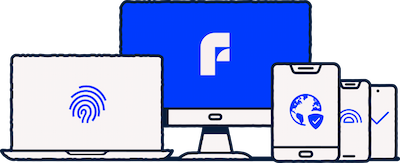What does spyware do?
Spyware infects your device and spies on what you do. It then passes the information to its masters. While many programs collect information about you, spyware does so without your consent and knowledge. And typically for malicious reasons. Some of the most common types of data spyware steals are:
Credit card information
Passwords and usernames
Information on what you do online
Criminals can use this information for account takeover and identity theft. Additionally, governments, advertisers and criminals can use spyware for surveillance. It can also be used to identify potential targets for further attacks.
How do spyware programs spy on you?
In the first half of 2020, 18 out of the 20 most common malware detected by F‑Secure were able to steal data. And many of them did more than that. Spyware often slows down your system and connection. It can also alter your device’s security settings and download more malware. You might see more ads and pop-ups on your device and browser. Constant pop-up ads and slowing down of the device are signs that your computer or phone may be infected with malicious spyware.
Once a spyware program is in, it can spy on you and steal your data in various ways. One way to do this is with a keylogger. Keyloggers track everything you write on your computer’s keyboard. By collecting a user’s keystrokes, a keylogger can easily steal passwords, bank account numbers and other valuable information. Although keyloggers are not illegal by design, they can be used as spyware to steal your valuable information. Spyware software can also save what you type on your mobile device.
How does your device get infected?
The most common way to get infected with malware is through email attachments and links. Quite often spyware is a Trojan and gets on your device when you install another program. You should be especially wary of free software that can be downloaded online at no cost. In reality, these seemingly free programs can come at the price of malicious software designed to monitor you and collect sensitive data without your consent.
Spyware can also utilize software vulnerabilities, especially in browsers to get in. If you have spyware on your device, it’s likely there’s other malware too. However, unlike a virus or a computer worm, spyware programs do not try to spread from one device to another. Rather, spyware aims to get the user to install it without them knowing.
Can mobile devices be infected with spyware?
Although some might think that their mobile devices are safe from malicious software, this sadly is not the case. Spyware is not an exception as mobile devices can be infected with spyware as well. Text messages, for example, can be used to infect your smartphone with a malicious spyware program.
One way a spyware program may get to your device is by exploiting the device’s Bluetooth connection. A good way to avoid mobile spyware is by not downloading third-party software and applications as these can come with unwanted malicious software. Use your device’s official app store, such as Google Play and Apple’s App Store, instead. Make sure to also avoid suspicious email attachments, just like on your computer.
Spyware example: Pegasus (NSO Group)
The Pegasus spyware is a well-known spyware program by the NSO Group, a technology company based in Israel. The Pegasus spyware targets mobile devices running both on the iOS and Android operating systems. It has infected devices globally since its development in 2011.
The Pegasus spyware gained much notoriety and attention in global media when it was discovered in the phone of Ahmed Mansoor, an Arab blogger and activist. The features of the Pegasus spyware have included taking screenshots, saving what you type on the device and listening to phone calls. On top of that, the program is capable of removing itself from the device when discovered.
5 anti-spyware tips
Like any other malware, you don’t want spyware on your device. Below are 5 spyware protection tips that help you stay safe.
1. Use antivirus software
Antivirus is also anti-spyware software. It’s your first and foremost spyware protection. Antivirus blocks malware from infecting your device and carries out automatic spyware removal. Keep also your firewalls on to stay protected against spyware.
2. Avoid opening links and attachments
The most common distribution methods for malware are attachments and links sent in emails and SMS messages. Only download and open files and links you trust.
3. Don’t download shady apps and programs
Spyware often comes hidden within another app. Only download and open files and apps you trust. Don’t download anything without an active antivirus. This applies both to mobile devices and desktop computers.
4. Keep your software and operating systems updated
Spyware software often takes advantage of security issues within apps, browsers, and operating systems. These issues are regularly fixed with updates. Enable automatic updates on your computer and phone to be safe.
5. Don’t grant apps unnecessary device permissions
Many apps collect information about you with your permission. Consider which apps need to get access to your contacts, microphone, location, etc. Don’t allow apps to collect information without a good reason. You can edit already granted permissions from your phone’s privacy settings.


)
)

